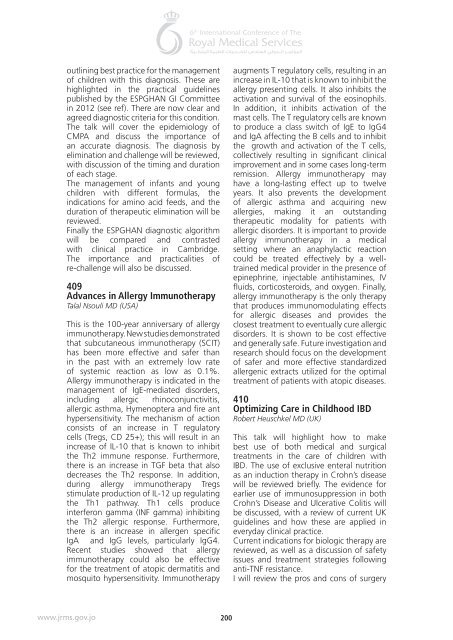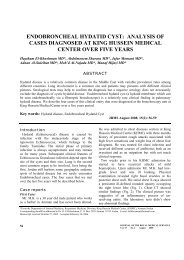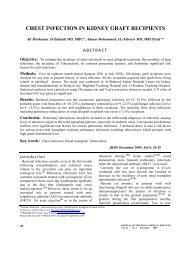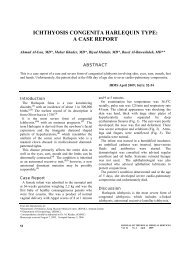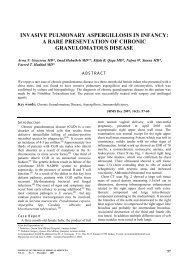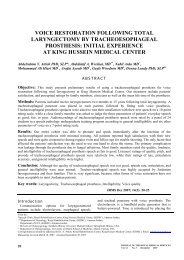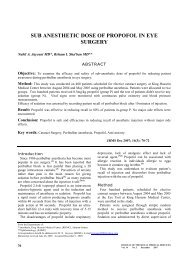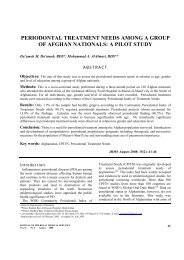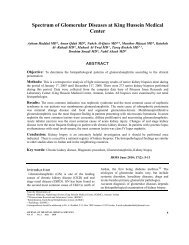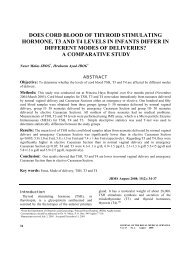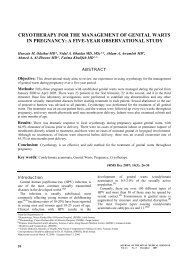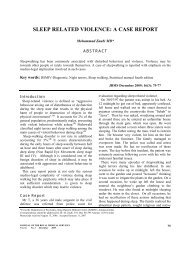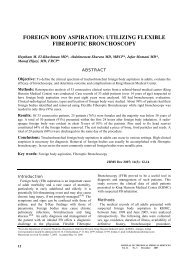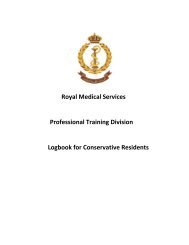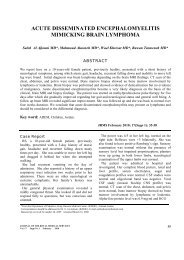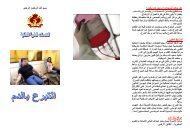Abstract book 6th RMS 16.indd
Abstract book 6th RMS 16.indd
Abstract book 6th RMS 16.indd
You also want an ePaper? Increase the reach of your titles
YUMPU automatically turns print PDFs into web optimized ePapers that Google loves.
outlining best practice for the management<br />
of children with this diagnosis. These are<br />
highlighted in the practical guidelines<br />
published by the ESPGHAN GI Committee<br />
in 2012 (see ref). There are now clear and<br />
agreed diagnostic criteria for this condition.<br />
The talk will cover the epidemiology of<br />
CMPA and discuss the importance of<br />
an accurate diagnosis. The diagnosis by<br />
elimination and challenge will be reviewed,<br />
with discussion of the timing and duration<br />
of each stage.<br />
The management of infants and young<br />
children with different formulas, the<br />
indications for amino acid feeds, and the<br />
duration of therapeutic elimination will be<br />
reviewed.<br />
Finally the ESPGHAN diagnostic algorithm<br />
will be compared and contrasted<br />
with clinical practice in Cambridge.<br />
The importance and practicalities of<br />
re-challenge will also be discussed.<br />
409<br />
Advances in Allergy Immunotherapy<br />
Talal Nsouli MD (USA)<br />
This is the 100-year anniversary of allergy<br />
immunotherapy. New studies demonstrated<br />
that subcutaneous immunotherapy (SCIT)<br />
has been more effective and safer than<br />
in the past with an extremely low rate<br />
of systemic reaction as low as 0.1%.<br />
Allergy immunotherapy is indicated in the<br />
management of IgE-mediated disorders,<br />
including allergic rhinoconjunctivitis,<br />
allergic asthma, Hymenoptera and fire ant<br />
hypersensitivity. The mechanism of action<br />
consists of an increase in T regulatory<br />
cells (Tregs, CD 25+); this will result in an<br />
increase of IL-10 that is known to inhibit<br />
the Th2 immune response. Furthermore,<br />
there is an increase in TGF beta that also<br />
decreases the Th2 response. In addition,<br />
during allergy immunotherapy Tregs<br />
stimulate production of IL-12 up regulating<br />
the Th1 pathway. Th1 cells produce<br />
interferon gamma (INF gamma) inhibiting<br />
the Th2 allergic response. Furthermore,<br />
there is an increase in allergen specific<br />
IgA and IgG levels, particularly IgG4.<br />
Recent studies showed that allergy<br />
immunotherapy could also be effective<br />
for the treatment of atopic dermatitis and<br />
mosquito hypersensitivity. Immunotherapy<br />
augments T regulatory cells, resulting in an<br />
increase in IL-10 that is known to inhibit the<br />
allergy presenting cells. It also inhibits the<br />
activation and survival of the eosinophils.<br />
In addition, it inhibits activation of the<br />
mast cells. The T regulatory cells are known<br />
to produce a class switch of IgE to IgG4<br />
and IgA affecting the B cells and to inhibit<br />
the growth and activation of the T cells,<br />
collectively resulting in significant clinical<br />
improvement and in some cases long-term<br />
remission. Allergy immunotherapy may<br />
have a long-lasting effect up to twelve<br />
years. It also prevents the development<br />
of allergic asthma and acquiring new<br />
allergies, making it an outstanding<br />
therapeutic modality for patients with<br />
allergic disorders. It is important to provide<br />
allergy immunotherapy in a medical<br />
setting where an anaphylactic reaction<br />
could be treated effectively by a welltrained<br />
medical provider in the presence of<br />
epinephrine, injectable antihistamines, IV<br />
fluids, corticosteroids, and oxygen. Finally,<br />
allergy immunotherapy is the only therapy<br />
that produces immunomodulating effects<br />
for allergic diseases and provides the<br />
closest treatment to eventually cure allergic<br />
disorders. It is shown to be cost effective<br />
and generally safe. Future investigation and<br />
research should focus on the development<br />
of safer and more effective standardized<br />
allergenic extracts utilized for the optimal<br />
treatment of patients with atopic diseases.<br />
410<br />
Optimizing Care in Childhood IBD<br />
Robert Heuschkel MD (UK)<br />
This talk will highlight how to make<br />
best use of both medical and surgical<br />
treatments in the care of children with<br />
IBD. The use of exclusive enteral nutrition<br />
as an induction therapy in Crohn’s disease<br />
will be reviewed briefly. The evidence for<br />
earlier use of immunosuppression in both<br />
Crohn’s Disease and Ulcerative Colitis will<br />
be discussed, with a review of current UK<br />
guidelines and how these are applied in<br />
everyday clinical practice.<br />
Current indications for biologic therapy are<br />
reviewed, as well as a discussion of safety<br />
issues and treatment strategies following<br />
anti-TNF resistance.<br />
I will review the pros and cons of surgery<br />
www.jrms.gov.jo<br />
200


